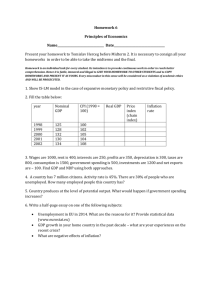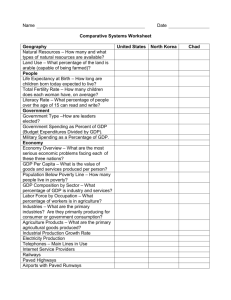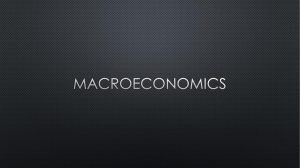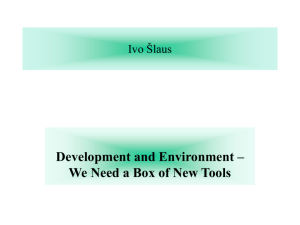Achievements and success
advertisement
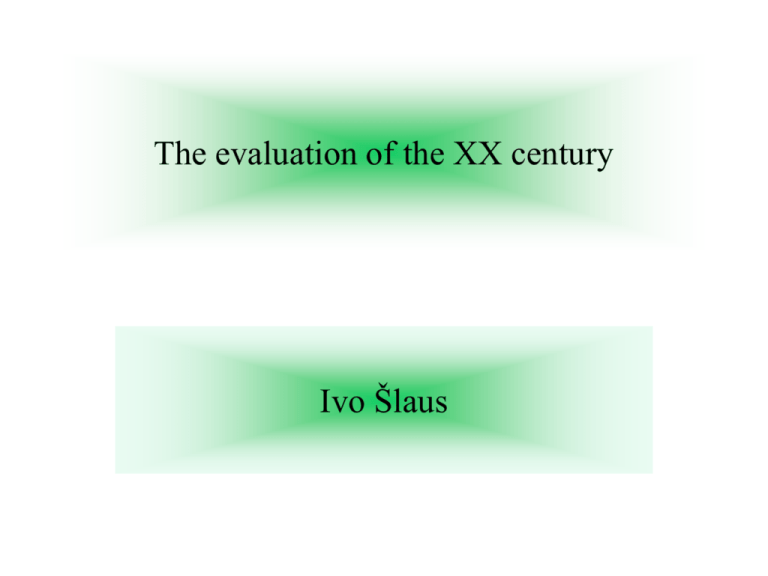
The evaluation of the XX century Ivo Šlaus Achievements and success ☺Progress in science and novel understanding, e.g.: quantum physics; theory of relativity: special and general; Standard model and its limitations: WMAP: only 4% of ordinary matter, 23% dark matter (?), 73% dark energy (?), age of our universe =13.7± 0.3 Gyear. Paradigmatic change! nanosciences and their relevance in many areas; DNA; advent of genetic engineering; advances in life sciences; brain research advances in chemistry and geosciences; advances in psychology and social sciences ☺Consilience – advances in all sci disciplines, interdisciplinarity, transdisciplinarity. ☺Advances in technology, e.g.: Information-communication technology (ICT); advances in life science technologies: CT, PET, MRI, synthetic biology. ☺”New scientific disciplines”, e.g. nuclear medicine, bioarchaelogy, scientometrics. ☺Our understanding and construction of instruments, and development of novel institutions, e.g. LHC; Planck satellite; CERN; EMBO Consequences ☼ rapid chages, τ (change) < τ (human lifespan), and much faster than ever ☼ globalization ☼ interconnectedness of the world ☺ much longer life expectancy and longer healthy active life duration (thruout the world)→ demographic transition ☺increased quality of life (thruout the world) ☺increased freedom in the world (are our measurement reliable?) The contemporary world: ◙ globalization – science generated Th. Friedman: 3 phases of globalization: 1) driven by states, 2) by states and MNC and 3) by and empowering individuals ◙ rapid changes – science generated (♥ we would be amoebas if there were no change) ◙ characterized by uncertainties and instabilities ◙ number of Earths required to provide resources used by humanity and to absorb their emissions for each year: 1970 1980 2005 2007 Goal: 2050 0.86 1.00 1.25 1.27 1.00 (???) ENVIRONMENT - ENERGY - FOOD - WATER World is dangerously in a state of overshoot. ◙ Increasing dissatisfaction of the public with governance ☼“People are the real wealth of nations. The basic aim of development is to enlarge human freedom and choices so that people live full and creative lives. This must benefit everybody equitably.” The State of Human Development, Human development indicators, 2004, p.127, UNDP ☼ We add: people - healthy, educated, active and happy, living in a society of social justice and social cohesion in a healthy environment assuring sustainable development. Not less - not more. Humans ← biological and cultural evolution humans change, and humans change the world they live in, (Crutzen) current geological epoch: Anthropocene. Intertwining humans ↔ machine+synthetic bio Governance Leadership in a rapidly changing world Economy – some results of the 20.c. Model of employment (low empl. rate?!) Retirement system –incompatible with demographic transition Price ≠ production cost (eg oil – govnt taxes, advertis., etc) Annual intl financial flow = 114 x values of goods and servic traded Money (as knowledge increases by using, creative power, out of control, “Common currency” – suggested in 1987 by R. Cooper and supported by R. Mundell, 2000) Deregulation ↔ Regulation ↔ Global regulation Progress and Public opinion Enormous progress has been achieved: - in 1893 only New Zealand could be considered a true democracy, - in 1972 there were 43 free, 38 partly free and 69 not free countries, -in 2002 there were 89 free countries, 56 partly free and 47 not free. and yet Citizens are not satisfied with their political systems. Gallup International's May 2005 Voice of the People survey of 50,000 citizens across 65 countries on 6 continents results statistically representative of the views of 1.4 billion citizens. Only 7% of the respondents strongly agree with the statement that the world is going in the right direction, and additional 23% somewhat agree with that statement, a mere 30% to be compared with 36% in the year 2001. 61%: globalization has a positive effect on them/ their families increased from 2001 when it has been 55%. 20.c is a measured century. Feasibility, Reliability and Uncertainty ↕ Robustness INDICATORS Input / Output ↕ (GDP, HDI ) quantitative ↔ qualitative (case studies) Inadequacies of GDP HDI, ISEW, GPI,...? USA GDP/c GPI/c 1950 11,672 8,611 1970 18,773 13,034 1990 28,434 14,893 Beyond GDP - EU and CoR, Nov 2007 2000 36,595 15,035 R.F. Kennedy “ We will find neither national purpose nor personal satisfaction in an endless amassing if worldly goods. We cannot measure national achievements by GDP, since GDP includes air pollution, cigarette advertisement and ambulances to clear our highways after carnage. It counts special locks for our doors and jails for people who break them. GDP includes destruction of redwoods and of Lake Superior. GDP grows with the production of napalm and nuclear warheads. It does not include the health of our families, the quality of their education, it is indifferent to the safety of our streets... In short, GDP measures everything except what makes life worthwhile.” Failures and problems characterizing the 20.c. ♠ Use of war, military and violence. During 20.c. 400 million men, women and children killed by their own governments, more than during wars (Rummel). States do not seem to be capable of protecting their own citizens, nor assuring them their basic human needs. ♠ Failure of governance – mission impossible? About 200 nation(so caled)-states + 600,000 TNC (with wealth often larger than some medium nationstates) + 50,000 international civil society organizations + 5,000-10,000 different cultures (languages - 90% with less than 10,000 persons). ♠ Old tools from old box still used, e.g. balance of power, deterence, enemies and friends concept. ♠ Clash of civilizations (of cultures??) ♠ New enemies and new problems: terrorism. ♠ Decrease in social capital. ♠ Social cohesion: Inequality compatible with the axiom “people are the wealth of nations” Plato: common good ratio rich : poor = 5:1, J.P. Morgan: bosses should have not more than 20 times the salary of their workers. Global Inequalities Fades as Global Economy Grows ?! Xavier Sala-i-Martin 2002 Market: - it is more than democracy since no tyranny of majority, - but, irrationality of the crowd, even tyranny of the mob - reality vs virtuality Free market ? financial instability → economic crisis demographic transition → 10 G → 2G climate change ← anthropocene (Rodrigo Rato, Annual Conf CoR,Madrid 2007) Many dangers and threats are recent, and many new will appear. Many recent opportunities and options, and new will appear. Future = predicted events + surprises → Scenaria • New ideas, new tools are required to cope with issues in the 21.c. – and age different from anything experienced and populated by humans changing and yet deeply rooted in their huntergatherer past. 1) Business-as-usual (never fully realizes) 2) Meadows et al(math.model diff.eqs, t-dependence of 45 variables and their interdependence). 1972 Limits to growth 3) The Heaven Scenario Ray Kurzweil “Singularity is near”: conquering disease & poverty, technology is in control, but wisdom, truth, ... peace? 4) The Hell Scenario Bill Joy “Why the future does not need us”, F. Fukuyama “Our posthuman future”: hostile world, destroying biosphere. 5) The Prevail Scenario Jaron Zepel Lanier (named “virtual reality”) “The Future that Loves Us”: increasing links among humans, transcendence is social, not solitary. Human are choosing their future. 6) Self-organized Mapping Neural network model (Najdovski, Zidanšek, Šlaus) Gordian knot Did successes of science resulting in technological power embedded in our hunter-gatherer framework create a knot, a contradiction, a threat to our own existence? How to overcome it? Is there an Alexandrian solution? Can it be? ☺“As never before, the future of each one of us depends on the good of all”- Nobel laureates 2000 ☺“Our safety, our prosperity indeed our freedom are indivisible.” (Kofi Annan, 2005) ☺ «Any effective reform in the structure of the world must be accompanied by changes in the thinking of people...People must be educated to an identity with and responsibility for all humanity.» (A. Peccei et al, Dubrovnik-Philadelphia declaration 1974-76) The greatest obstacles are individual and social inner limits - psychological, cultural and political expressed through personal and collective myopia, irresponsibility and incorrect governance. “The most valuable assets humankind can count on..to stop the decline and to prepare for the future are to be found in the still untapped resources of comprehension, vision and creativity..inherent in every human being.” A. Peccei, Agenda for the End of the Century, March 14, 1984

